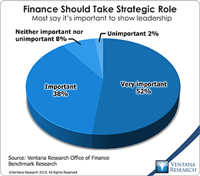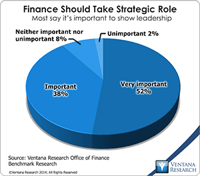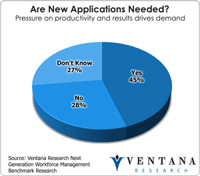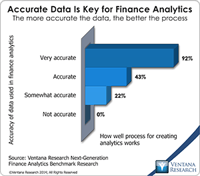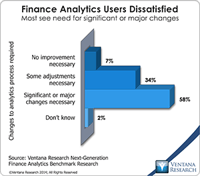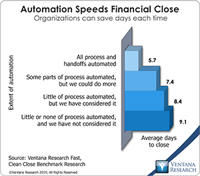SYSPRO is a 35-year-old software vendor that focuses on selling enterprise resource planning (ERP) systems to midsize companies, particularly those in manufacturing and distribution. In manufacturing, SYSPRO supports make, configure and assemble, engineer to order, make to stock and job shop environments. The company attempts to differentiate itself through vertical specialization and its years of ongoing development, which can reduce the need for customization and cut the cost of initial and...
Read More
Topics:
Big Data,
SaaS,
ERP,
Governance,
Human Capital Management,
Office of Finance,
close,
Continuous Accounting,
Analytics,
CIO,
Cloud Computing,
Collaboration,
CFO,
CRM,
CEO
The imperative to transform the finance department to function in a more strategic, forward-looking and action-oriented fashion has been a consistent theme of practitioners, consultants and business journalists for two decades. In all that time, however, most finance and accounting departments have not changed much. In our benchmark research on the Office of Finance, nine out of 10 participants said that it’s important or very important for finance departments totake a strategic role in running...
Read More
Topics:
Big Data,
Planning,
Predictive Analytics,
Social Media,
Governance,
GRC,
Mobile Technology,
Office of Finance,
Budgeting,
close,
Continuous Accounting,
Continuous Planning,
end-to-end,
Human Capital,
Tax,
Analytics,
Business Analytics,
Business Collaboration,
CIO,
Cloud Computing,
In-memory,
Uncategorized,
Business Performance Management (BPM),
CFO,
CPQ,
Financial Performance Management (FPM),
Risk,
CEO,
Financial Performance Management,
FPM
Last year Ventana Research released our Office of Finance benchmark research. One of the objectives of the project was to assess organizations’ progress in achieving “finance transformation.” This term denotes shifting the focus of CFOs and finance departments from transaction processing toward more strategic, higher-value functions. In the research nine out of 10 participants said that it’s important or very important for the department to take a more strategic role. This objective is both...
Read More
Topics:
Big Data,
Planning,
Predictive Analytics,
Governance,
GRC,
Office of Finance,
Budgeting,
close,
end-to-end,
Tax,
Tax-Datawarehouse,
Analytics,
CIO,
In-memory,
Business Performance Management (BPM),
CFO,
CPQ,
Financial Performance Management (FPM),
Risk,
CEO,
Financial Performance Management,
FPM
A company’s enterprise resource planning (ERP) system is one of the pillars of its record-keeping and process management architecture and is central to many of its critical functions. It is the heart of its accounting and financial record-keeping processes. In manufacturing and distribution, ERP manages inventory and some elements of logistics. Companies also may use it to handle core human resources record-keeping and to store product and customer master data. Often, companies bolt other...
Read More
Topics:
ERP,
Office of Finance,
Operational Performance Management (OPM),
Analytics,
CIO,
Business Performance Management (BPM),
CFO,
Customer Performance Management (CPM),
Data,
Financial Performance Management (FPM),
HR,
Sales Performance Management (SPM),
Supply Chain Performance Management (SCPM),
Workforce Performance Management (WPM)
Our research consistently finds that data issues are a root cause of many problems encountered by modern corporations. One of the main causes of bad data is a lack of data stewardship – too often, nobody is responsible for taking care of data. Fixing inaccurate data is tedious, but creating IT environments that build quality into data is far from glamorous, so these sorts of projects are rarely demanded and funded. The magnitude of the problem grows with the company: Big companies have more...
Read More
Topics:
Big Data,
Planning,
Predictive Analytics,
Governance,
Office of Finance,
Operational Performance Management (OPM),
Budgeting,
close,
Finance Analytics,
Tax,
Analytics,
Business Analytics,
Business Intelligence,
CIO,
Governance, Risk & Compliance (GRC),
In-memory,
Business Performance Management (BPM),
CFO,
Financial Performance Management (FPM),
Information Applications (IA),
Risk,
Workforce Performance Management (WPM),
CEO,
Financial Performance Management,
FPM
Business computing has undergone a quiet revolution over the past two decades. As a result of having added, one-by-one, applications that automate all sorts of business processes, organizations now collect data from a wider and deeper array of sources than ever before. Advances in the tools for analyzing and reporting the data from such systems have made it possible to assess financial performance, process quality, operational status, risk and even governance and compliance in every aspect of a...
Read More
Topics:
Big Data,
Planning,
Predictive Analytics,
Governance,
Office of Finance,
Budgeting,
close,
Finance Analytics,
Tax,
Analytics,
Business Analytics,
Business Intelligence,
CIO,
Governance, Risk & Compliance (GRC),
In-memory,
Business Performance Management (BPM),
CFO,
Financial Performance Management (FPM),
Information Management (IM),
Risk,
CEO,
Financial Performance Management,
FPM
A core objective of my research practice and agenda is to help the Office of Finance improve its performance by better utilizing information technology. As we kick off 2014, I see five initiatives that CFOs and controllers should adopt to improve their execution of core finance functions and free up time to concentrate on increasing their department’s strategic value. Finance organizations – especially those that need to improve performance – usually find it difficult to find the resources to...
Read More
Topics:
Big Data,
Performance Management,
Planning,
Predictive Analytics,
Office of Finance,
Budgeting,
close,
dashboard,
PRO,
Tax,
Analytics,
Business Analytics,
Business Collaboration,
CIO,
In-memory,
Business Performance Management (BPM),
CFO,
Customer Performance Management (CPM),
Financial Performance Management (FPM),
Sales Performance Management (SPM),
Supply Chain,
Supply Chain Performance Management (SCPM),
CEO,
demand management,
Financial Performance Management,
FPM,
S&OP
Senior finance executives and finance organizations that want to improve their performance must recognize that technology is a key tool for doing high-quality work. To test this premise, imagine how smoothly your company would operate if all of its finance and administrative software and hardware were 25 years old. In almost all cases the company wouldn’t be able to compete at all or would be at a substantial disadvantage. Having the latest technology isn’t always necessary, but even though...
Read More
Topics:
Big Data,
Planning,
Predictive Analytics,
Governance,
GRC,
Office of Finance,
Budgeting,
close,
Tax,
Analytics,
Business Analytics,
Business Collaboration,
CIO,
Cloud Computing,
Governance, Risk & Compliance (GRC),
In-memory,
Business Performance Management (BPM),
CFO,
Financial Performance Management (FPM),
Risk,
CEO,
Financial Performance Management,
FPM
Oracle continues to enrich the capabilities of its Hyperion suite of applications that support the finance function, but I wonder if that will be enough to sustain its market share and new generation of expectations. At the recent Oracle OpenWorld these new features were on display, and spokespeople described how the company will be transitioning its software to cloud deployment. Our 2013 Financial Performance Management Value (FPM) Index rates Oracle Hyperion a Warm vendor in my analysis,...
Read More
Topics:
Big Data,
Mobile,
Planning,
Social Media,
ERP,
Human Capital Management,
Modeling,
Office of Finance,
Reporting,
Budgeting,
close,
closing,
Consolidation,
Controller,
driver-based,
Finance Financial Applications Financial Close,
Hyperion,
IFRS,
Tax,
XBRL,
Analytics,
Business Analytics,
Business Intelligence,
CIO,
Cloud Computing,
In-memory,
Oracle,
Business Performance Management (BPM),
CFO,
compliance,
Data,
Financial Performance Management (FPM),
benchmark,
Financial Performance Management,
financial reporting,
FPM,
GAAP,
Integrated Business Planning,
Price Optimization,
Profitability,
SEC Software
Businesses always see a lag between when technology makes some advance possible and when a majority of companies actually adopt it. There’s even a longer lag between the emergence of an advance in a business process or technique and the time it takes to become mainstream. When we write our research agendas at the top of each year, we have to strike a balance between focusing on the new and different, which is still many years away from general acceptance, and the mainstream, which has been...
Read More
Topics:
Big Data,
Planning,
Predictive Analytics,
Governance,
GRC,
Office of Finance,
Operational Performance Management (OPM),
Budgeting,
close,
Analytics,
Business Analytics,
Business Collaboration,
CIO,
Cloud Computing,
In-memory,
Business Performance Management (BPM),
CFO,
Financial Performance Management (FPM),
Risk,
Sales Performance Management (SPM),
Workforce Performance Management (WPM),
CEO,
Financial Performance Management,
FPM


